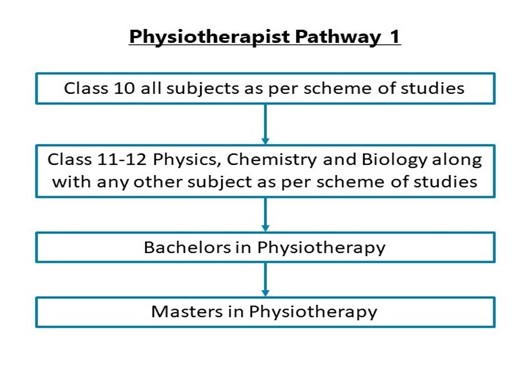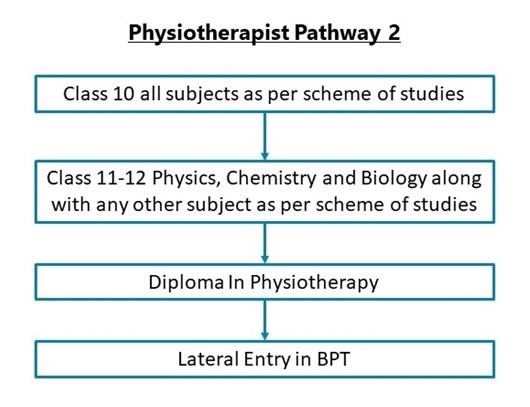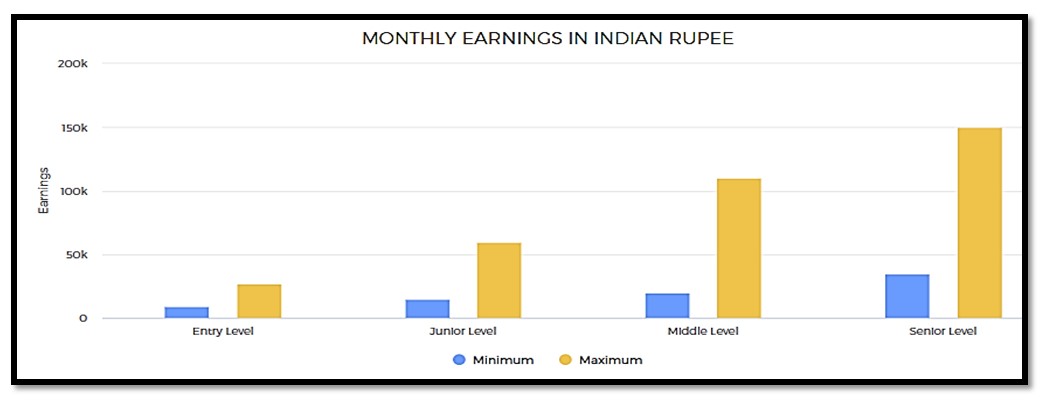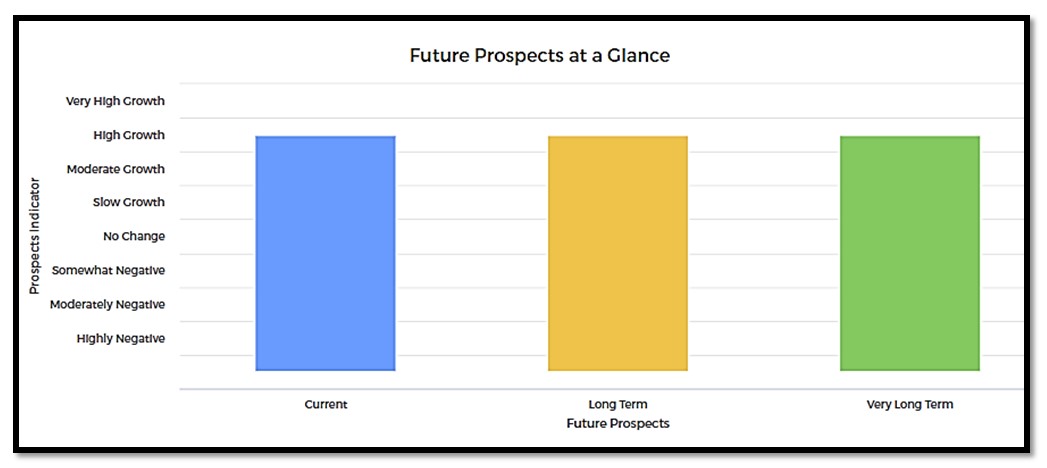Physiotherapist
Entry Level Qualification
12
Career Fields
Medical Services
For Specially Abled




Career Entrance Exam
About Career
PARTICULARS | DESCRIPTION |
Name | Physiotherapist |
Purpose | Rehabilitation |
Career Field | Medical Services |
Required Entrance Exam | NEET UG |
Average Salary | 200000 - 300000 Rs. Per Year |
Companies For You | Private Hospitals, Public Hospitals, Rehabilitation Centres for Physical Disabilities & Many More |
Who is Eligible | Class 12th Pass |
1. As a physiotherapist, you will help improve movement in patients facing physical difficulties that happen as a result of illness, injury, disability, or aging. Physiotherapists help ease the pain of the patients.
2. In this profession, you’ll devise, administer, and execute treatment programs like massages, therapeutic exercises, electrotherapy, etc. You’ll also be responsible for evaluating treatment methods at each stage and adjusting them to attain maximum relief.
3. You will assess, plan, and organize rehabilitative programs that improve mobility, and will be responsible for carrying out programs that help increase strength and improve or correct disabling conditions resulting from disease or injury, based on the patient’s medical history & informed consent.
Key Roles And Responsibilities
1. Plan, prepare, organize, and administer individual treatment programs to aid physical treatment, improve movement, or lessen pain in patients.
2. Examine patients and correlate data with medical history to lay out a diagnosis.
3. Inspect treatment methods at each stage and adjust them to attain maximum relief.
4. Keep track of the course that the illness takes, treatment, response, and progress in the patient's case and record them.
5. Obtain the patient's informed consent to planned interventions.
6. Test and document the patient's strength, motor development and function, sensory perception and breathing, functional capacity, or circulation
7. Instructing patient and family in treatment procedures to be continued at home.
8. Administer manual therapy, massage, or routines to help relieve pain, increase patient strength, or decrease or prevent deformity.
9. Inform patients and refer them to requisite professionals if the diagnosis reveals findings outside physical therapy.
10. Confer with the patient, and medical practitioners to plan the appropriate approach moving forward.
11. Evaluate, fit, or adjust prosthetic or orthotic devices or recommend modifications.
12. Conduct or support research and dish out training.
Career Entry Pathway
Class 10 all subjects as per the scheme of studies – Class 11-12 Physics, Chemistry, and Biology along with any other subject as per the scheme of studies - Bachelors in Physiotherapy- Masters in Physiotherapy.

After your Class 10 all subjects as per the scheme of studies, complete Class 11-12 Physics, Chemistry, and Biology along with any other subject as per the scheme of studies, following which you can apply for a Bachelor in Physiotherapy. Selection is based on merit or is subject to the college’s discretion. You can then opt for a Master's in Physiotherapy.

After your Class 10 all subjects as per the scheme of studies, complete Class 11-12 Physics, Chemistry, and Biology along with any other subject as per the scheme of studies, following which you can apply for a Diploma In Physiotherapy after which you can get a Lateral Entry in BPT.
Required Qualification & Competencies
For Undergraduate Studies
1. After your Class 10 all subjects as per the scheme of studies, complete Class 11-12 Physics, Chemistry, and Biology along with any other subject as per the scheme of studies, after which you can enroll in a Bachelor of Physiotherapy (BPT) course in institutes across India. It is a 4-year course which is followed by six months of mandatory internship. College admissions are based on merit, or subject to the college’s discretion.
2. You can also go for diploma courses like Diploma In Physiotherapy and then make a Lateral Entry in BPT.
Post-Graduation
1. After graduation, you may choose to study further with a Master’ degree in Physiotherapy (MPT), which is a two-year course and allows you to pick and emphasize an area of specialization such as orthopedic physiotherapy, neurological physiotherapy, musculoskeletal physiotherapy, and more.
2. If you wish to carry on with research in areas of your specialization, you can study further and go for a Doctorate in Physiotherapy (Ph.D.)
MINIMUM EDUCATION REQUIRED | MAXIMUM EDUCATION REQUIRED |
Under Graduate Undergraduate Degree / Honours Diploma / Graduate Diploma (equivalent to a Degree) Programs for which the minimum eligibility is a pass in Higher Secondary / Class XII School Leaving examination. | Post Graduate Postgraduate Degree / Diploma / Certificate Programs for which the minimum eligibility is a pass in Graduation / equivalent Diploma program like Honours Diploma or Graduate Diploma. |

Competencies Required
Interests
1. Realistic — Realistic occupations frequently involve work activities that include practical, hands-on problems and solutions.
2. Social — Social occupations frequently involve working with, communicating with, and teaching people.
3. Investigative — Investigative occupations frequently involve working with ideas and require an extensive amount of thinking.
Knowledge
1. English Language: Knowledge about English grammar, words, spelling, sentence construction, using English to communicate with others, reading in English, etc.
2. Healthcare Science and Services: Knowledge of different fields that are related to offering various types of healthcare services to people; assisting physicians and surgeons to carry out diagnosis, treatment, and prevention of human diseases, ailments, and disorders. This includes knowledge of different practices apart from medicine which are used to treat and prevent human diseases or to provide holistic healthcare and wellness. This also includes knowledge about drugs and medicines.
3. Personal Care Service: Knowledge of how to provide various assistance and services to others. This includes looking after the needs of individuals, understanding what they need, and providing all assistance at home or elsewhere.
Skills
1. Active Listening: Giving full attention to what other people are saying, understanding the points being made by others, asking questions, etc.
2. Coordination: Skills in working together with other people to get things done.
3. Critical Thinking: Skills in the analysis of complex situations, using logic and reasoning to understand the situations and take appropriate actions or make interpretations and inferences.
4. Judgment and Decision Making: Skills in considering the pros and cons of various decision alternatives; considering costs and benefits; and making appropriate and suitable decisions.
5. Problem Solving: Skills in analysis and understanding of problems, evaluating various options to solve the problems, and using the best option to solve the problems.
Abilities
1. Abstract Reasoning: The ability to understand ideas that are not expressed in words or numbers; the ability to understand concepts that are not clearly expressed verbally or otherwise.
2. Deductive Reasoning: The ability to apply general rules and common logic to specific problems to produce answers that are logical and make sense. For example, understanding the reasons behind an event or a situation using general rules and common logic.
3. Emotional Intelligence: The ability to understand your own and others' emotions and feelings; empathy for others; adjusting your behavior or self-control and self-regulation according to others' emotions and situations.
4. Hand-Eye Coordination: The ability to make quick and precise hand movements as per visual observations and understanding (that is, what you see and comprehend).
5. Inter-Personal: The ability to build and maintain good relationships with others at workplaces and elsewhere.
6. Problem Sensitivity: The ability to tell when something is wrong or is likely to go wrong. It does not involve solving the problem, only recognizing there is a problem.
7. Selective Attention: The ability to concentrate on a task over a long period without being distracted.
8. Verbal Reasoning: The ability to think and reason with words; the ability to reason out ideas expressed in words.
9. Written Expression: The ability to communicate information and ideas in writing so others will understand.
Personality
1. You are always or mostly organized in your day-to-day life and activities.
2. You are always or mostly a soft-hearted person.
3. You are always or mostly helpful to others.
4. You are always or mostly caring, supportive, sympathetic, and kind to others.
5. You remain calm in difficult situations sometimes but some other times you are anxious.
6. You always or mostly prefer to stick within a routine or carry out routine and repetitive activities.
Career - Job Opportunities & Profiles
After finishing your graduation/postgraduation degree in physiotherapy, you can get a job The entry-level jobs and profiles in these departments are subject to how advanced your qualifications and skills are and are also subject to the area of specialization discussed earlier. Following are some fresher jobs :
1. Assistant Physiotherapist
2. Sports Physiotherapist
3. Fitness Assistant
4. Self-Employed Private Physiotherapist
5. Rehabilitative Physiotherapist
Some Organizations where you can find jobs:
1. Private Hospitals
2. Public Hospitals
3. Educational Institutions
4. Sports Teams
5. Defense
6. Rehabilitation Centres for Physical Disabilities
Work Environment
1. Physiotherapists typically have a 40-45 work hour week. They work in hospitals, outpatient clinics, rehabilitation centers, and private offices with specially equipped facilities.
2. The need for precision is extremely high owing to the nature of their job, and errors can have bad consequences
3. They have to crouch, stoop, lift, kneel, and stand for long periods. Also, physiotherapists may have to lift patients or assist them to stand, turn, or walk, while sometimes, heavy equipment might require moving.
Specialisation Tracks In This Career
1. Physiotherapist (Cardio-Pulmonary)
It is an area of specialization under physiotherapy that deals with the treatment and rehabilitation of people suffering from ailments and injuries of the heart and lungs. The conditions may be asthma, shortness of breath, and persistent cough among others
2. Physiotherapist (Musculoskeletal)
Musculoskeletal therapy deals with the treatment and rehabilitation of injuries and conditions in muscles, joints, and soft tissue
3. Physiotherapist (Neurological)
Neurological physiotherapy aims to kick start neural responses in brains as treatment and response to neurological conditions such as stroke, and head and spinal cord injuries.
4. Physiotherapist (Orthopaedic)
Orthopedic physiotherapy is concerned with the treatment of injuries or disorders of the skeletal system and associated muscles, joints, and ligaments. Orthopaedic Physiotherapy also includes pre and post-operative rehabilitation of the hip, shoulder, and knee.
5. Physiotherapist (Sports)
This branch of physiotherapy is concerned with preserving fitness, preventing injuries and administering rehabilitative routines to athletes and other sportspeople.
Career Growth
1. Growth opportunities are slow in the initial years and then high as you gain more skill & experience. You will start as a trainee physiotherapist working under a senior physiotherapist. After 2-4 years of training, you can become an assistant physiotherapist.
2. Higher-level roles include positions such as assistant department head, department head, chief physiotherapist, or medical officer roles.
Salary Offered
1. The salary of a Physiotherapist varies widely depending on the educational qualification, skill, and experience of a physiotherapist. The reputation and merit of the educational institute are also a big factor in defining initial salaries.
2. Freshers typically start as assistants and even apprentices with a salary of 15,000 to 25,000 per month.
3. After accumulating relevant experience and skills on the job, you can expect supervisory positions with more autonomy and salary, with salary scales ranging anywhere between Rs 30,000 to 1,00,000 or even more per month.

Monthly Earnings In Indian Rupee
Entry Level | Junior Level | Mid Level | Senior Level | ||||
Min Earning | Max Earning | Min Earning | Max Earning | Min Earning | Max Earning | Min Earning | Max Earning |
9000 | 27000 | 15000 | 60000 | 20000 | 110000 | 35000 | 150000 |
1. Entry level: 0 - 2 years of work experience
2. Junior Level: From 1 to 12 years of work experience
3. Mid Level: From 5 to 20+ years of work experience
4. Senior Level: From 10 to 25+ years of work experience (there could be exceptions in some high-end technical, financial, engineering, creative, management, sports, and other careers; also shortly, people will reach these levels much faster in many careers and some careers, these levels will have no meaning as those careers will be completely tech skill driven such as even now, there is almost no level in a Cyber Security Expert’s job)
Work Activities
1. Assisting and caring for people: Assisting people in availing of services; taking care of people in different situations; offering help and services to others.
2. Communicating with co-workers and others: Communicating with people in writing, verbally or otherwise inside your workplace and various other people who have professional relationships with your place of work including vendors, government officials, etc., or with people at large.
3. Decision-making and problem-solving: Analysis of data and information; evaluation of alternative decisions and results of decisions; taking the right decisions and solving problems.
4. Getting Information and learning: Observing, hearing, reading, using computers, or otherwise obtaining information and learning from it.
5. Identifying objects, actions, and events: Identifying various characteristics of objects; observing and understanding actions and events; understanding changes in actions and events.
6. Inspecting situations, events, and people: Inspecting situations, events, and people to understand the reasons and causes for the situation or events to happen; inspecting people to understand reasons behind their behavior and actions.
7. Organising, planning, and prioritizing tasks: Planning and organizing tasks to achieve work goals; prioritizing tasks to achieve goals and making the best use of the time available.
8. Providing advice and consultation to others: Giving advice or consultation to others about various issues, conceptual matters, know-how, scientific matters, products, or services.
9. Updating and using relevant knowledge: Keeping updated with the latest knowledge relevant to your fields of work and using the relevant knowledge in getting things done.
10. Using computers for work: Using computers for day-to-day office work; using computer software for various applications in day-to-day professional work; entering data and processing information; for writing.
11. Working directly with people: Working directly with people to offer them products and services, providing assistance, etc.
Future Prospects
The healthcare market in India can increase threefold to Rs 8.6 trillion (US$ 133.44 billion). The physiotherapy equipment market in India is projected to grow at a CAGR (compounded annual growth rate) of over 12%. This growth may be attributed to people’s unwillingness to continue being dependent on conventional drugs, the increasing prevalence of cardiovascular and neurological diseases, the expanding elderly population, and the escalating demand for at-home physiotherapy. This data predicts good growth for healthcare worker profiles such as physiotherapists, as awareness about the therapeutic benefits of physiotherapy such as improving mobility and strengthening affected body areas has significantly increased, and resultantly so has the demand for physiotherapists.

Future Prospects At A Glance
Current (0-1 year) | Long Term (2-5 years) | Very Long Term (6-10 years) |
High Growth | High Growth | High Growth |


